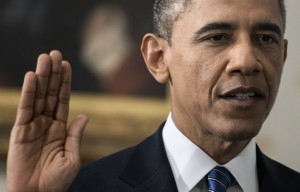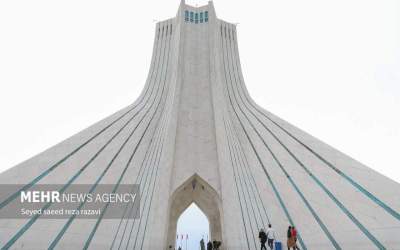 Despite an admirable intellect and dedicated support for US military personnel at war, former Secretary of Defense Robert Gates says President Barack Obama didnít have sufficient faith in the troop-surge strategy he ordered in Afghanistan.
Despite an admirable intellect and dedicated support for US military personnel at war, former Secretary of Defense Robert Gates says President Barack Obama didnít have sufficient faith in the troop-surge strategy he ordered in Afghanistan.After months of debate with Gates and top advisers, Obama ordered a troop surge in Afghanistan in late 2009. Around 30,000 soldiers were to be the final push for stabilizing the war-torn country before a phased withdrawal starting in mid-2011.
ďI never doubted Obamaís support for the troops, only his support for their mission,Ē†Gates writes in†ďDuty: Memoirs of a Secretary at War.Ē
Gates writes that after Gen. David Petraeus, then the central commander for both major wars, made public remarks suggesting he was not comfortable to setting a fixed date for the US militaryís withdrawal from Afghanistan, Obama openly chided his military leadership for†ďpopping off in the pressĒ†during a major National Security Council meeting.
According to Gates, Obama said,†ďĎIf I believe I am being gamed Öí and left the sentence hanging there with the clear implication the consequences would be dire.Ē
Gates added:†ďI was pretty upset myself. I thought implicitly accusingĒ†Petraeus, and possibly Chair of the Joints Chiefs of Staff Adm. Mike Mullen and Gates himself,†ďof gaming him in front of thirty people in the Situation Room was inappropriate, not to mention highly disrespectful of Petraeus. As I sat there, I thought: the president doesnít trust his commander, canít stand [Afghanistan President Hamid] Karzai, doesnít believe in his own strategy, and doesnít consider the war to be his. For him, itís all about getting out.Ē
In addition, Gates said that during a contentious September 2009 meeting with White House staff on Afghanistan policy, he nearly stepped down.
ďI was deeply uneasy with the Obama White Houseís lack of appreciation ó from the top down - of the uncertainties and unpredictability of war,Ē†he recalls.†ďI came closer to resigning that day than at any other time in my tenure, though no one knew it.Ē
Gates was the lone holdover from Republican President George W. Bushís Cabinet to serve in President Obamaís White House after the Democrat entered office in January 2009. He oversaw crucial moments of at least two major wars, in Iraq and Afghanistan, at the helm of the Pentagon, from December 2006 to July 2011.
Gates said George W. Bushís White House squandered success during the early phases of the Iraq and Afghanistan wars. Yet Gates writes that he is not sure how he would have answered if Bush had asked Gates in 2003 whether war in Iraq was the right decision.
Gates praised Bushís order for a troop surge in Iraq, which, with with the help of cash incentives, tampered down insurgent violence.
He notes that he and Bushís second Secretary of State Condoleezza Rice were the only voices urging the President to close the prison at Guantanamo Bay, with no success.
Gates said Obamaís decision to send Navy SEALs to attack a housing compound in Pakistan targeting Osama bin Laden was†ďone of the most courageous decisions I had ever witnessed in the White House.Ē
His memoir goes to great lengths to convey how much he was concerned for US troopsí safety amid so much conflict, saying he has†ďan overwhelming sense of personal responsibilityĒ†for the troops he ordered into combat.
Gates said both Obama and Hillary Clinton admitted to him that their opposition to the Iraq war during their heated 2008 presidential primary campaign hinged on political calculations.
ďHillary told the president that her opposition to the [2007] surge in Iraq had been political because she was facing him in the Iowa primary. ... The president conceded vaguely that opposition to the Iraq surge had been political. To hear the two of them making these admissions, and in front of me, was as surprising as it was dismaying.Ē
The former Defense secretary has glowing remarks for Cabinet colleague Clinton. He†"found her smart, idealistic but pragmatic, tough-minded, indefatigable, funny, a very valuable colleague, and a superb representative of the United States all over the world."
Not unlike other tomes written by former Cabinet officials in the past, Gatesí memoir, reviewed Tuesday by The New York Times and The Washington Postís Bob Woodward, is chock full of political drama and internecine intrigue. For instance, Gates calls Vice President Joe Biden a†ďman of integrity,Ēbut nevertheless says Biden led the White House staffís supposed suspicion of the Pentagon,†ďpoisoning the wellĒ†against military leadership.
ďI think he has been wrong on nearly every major foreign policy and national security issue over the past four decades,"†Gates wrote of Biden.
The White House released a statement Tuesday saying Obama stands behind Biden, a longtime US senator before joining the Obama administration.
"The President disagrees with Secretary Gates' assessment Ė from his leadership on the Balkans in the Senate, to his efforts to end the war in Iraq, Joe Biden has been one of the leading statesmen of his time, and has helped advance Americaís leadership in the world. President Obama relies on his good counsel every day,"†National Security Council Spokesperson Caitlin Hayden said in the statement.
Gates also reveals that Obama nearly ordered a criminal investigation into disclosures on Iran policy published by The New York Times, and that once the White House pointed the blame at Pentagon officials, only Obama would†ďacknowledge to me he had problems with leaks in his own shop.Ē
Gates relays in a new memoir how frustrating it was for him, leading the US military at a time of two major wars, to have to battle a White House staff often intent on wresting control over war policy from the Pentagon. He says Obamaís inner-circle, most with only political or academic backgrounds, became†ďincreasingly operational,Ē†which resulted in†ďmicromanagement of military matters - a combination that had proven disastrous in the past.Ē
Though he has served eight United States presidents, Gates says Obamaís White House staff was the most†ďcentralized and controllingĒ†about national security policy since the Richard Nixon administration.
ďI never confronted Obama directly over what I (as well as [then-Secretary of State Hillary] Clinton, [then-CIA Director Leon] Panetta, and others) saw as the presidentís determination that the White House tightly control every aspect of national security policy and even operations. His White House was by far the most centralized and controlling in national security of any I had seen since Richard Nixon and Henry Kissinger ruled the roost.Ē
Obamaís inner sanctum annoyed Gates so much, that he writes he was compelled to deliver a†ďrantĒ†to national security staff who were making decisions about Libyan intervention policy without Pentagon insight.
A former CIA director under President George H.W. Bush, Gates said he admired Obamaís intellect and decision-making, adding that the President was not afraid to support positions†ďopposed by his political advisers or that would be unpopular with his fellow Democrats.Ē†Yet Gates said there were times he questioned Obamaís commitment to advice from the Pentagon and to his own strategies once implemented.
By Russia Today
The Iran Project is not responsible for the content of quoted articles.










